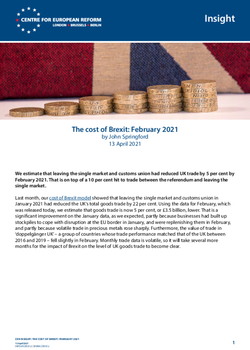
The cost of Brexit: February 2021
We estimate that leaving the single market and customs union had reduced UK trade by 5 per cent by February 2021. That is on top of a 10 per cent hit to trade between the referendum and leaving the single market.
Last month, our cost of Brexit model showed that leaving the single market and customs union in January 2021 had reduced the UK’s total goods trade by 22 per cent. Using the data for February, which was released today, we estimate that goods trade is now 5 per cent, or £3.5 billion, lower. That is a significant improvement on the January data, as we expected, partly because businesses had built up stockpiles to cope with disruption at the EU border in January, and were replenishing them in February, and partly because volatile trade in precious metals rose sharply. Furthermore, the value of trade in ‘doppelgänger UK’ – a group of countries whose trade performance matched that of the UK between 2016 and 2019 – fell slightly in February. Monthly trade data is volatile, so it will take several more months for the impact of Brexit on the level of UK goods trade to become clear.

To estimate the effect of single market and customs union exit, we use trade data from other advanced economies. An algorithm chooses – from a ‘donor pool’ of 22 advanced economies – a smaller selection of countries with economic characteristics that most closely matched those of the UK over the last decade. Those countries are combined into the doppelgänger, with the relative weighting of the selected countries chosen to create the smallest possible deviation from the real UK goods trade data between 2016 and 2019. By comparing the UK’s actual goods trade performance from January 2021 to that of the doppelgänger, we can assess how leaving the single market and customs union has affected Britain’s trade in goods. (For more details on how the model works, see last month’s piece.)
COVID-19 does not significantly affect our model, because we only use it to evaluate the UK’s performance from January 2021, when goods trade in advanced economies had largely recovered to pre-pandemic levels. The countries in our doppelgänger UK are chosen using pre-pandemic data, which also reduces the impact of the virus on our estimate.
Our second estimate compares the UK data to a doppelgänger that did not vote to leave the EU: had the UK voted to remain in the EU in June 2016, its trade would be significantly higher. The depreciation of sterling after the referendum hurt UK trade, instead of helping British exporters as many speculated. The unwinding of UK-EU supply chains in anticipation of trade barriers also reduced trade flows. Our second doppelgänger is made up of the countries whose goods trade had the smallest possible difference from the real UK data between January 2012 and the referendum in June 2016. According to this estimate, the Brexit process had reduced UK goods trade by £8 billion, or 10 per cent, between the referendum and the end of 2020.

John Springford is deputy director of the Centre for European Reform.




Add new comment